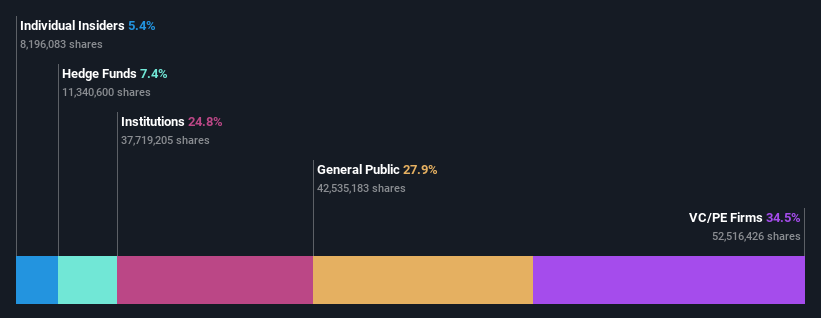- United States
- /
- Healthcare Services
- /
- NasdaqCM:TALK
Private equity firms are Talkspace, Inc.'s (NASDAQ:TALK) biggest owners and were hit after market cap dropped US$41m
A look at the shareholders of Talkspace, Inc. (NASDAQ:TALK) can tell us which group is most powerful. We can see that private equity firms own the lion's share in the company with 34% ownership. Put another way, the group faces the maximum upside potential (or downside risk).
And last week, private equity firms endured the biggest losses as the stock fell by 15%.
In the chart below, we zoom in on the different ownership groups of Talkspace.
See our latest analysis for Talkspace

What Does The Institutional Ownership Tell Us About Talkspace?
Many institutions measure their performance against an index that approximates the local market. So they usually pay more attention to companies that are included in major indices.
As you can see, institutional investors have a fair amount of stake in Talkspace. This can indicate that the company has a certain degree of credibility in the investment community. However, it is best to be wary of relying on the supposed validation that comes with institutional investors. They too, get it wrong sometimes. It is not uncommon to see a big share price drop if two large institutional investors try to sell out of a stock at the same time. So it is worth checking the past earnings trajectory of Talkspace, (below). Of course, keep in mind that there are other factors to consider, too.

Our data indicates that hedge funds own 7.4% of Talkspace. That's interesting, because hedge funds can be quite active and activist. Many look for medium term catalysts that will drive the share price higher. The company's largest shareholder is NVP Associates, LLC, with ownership of 9.7%. Meanwhile, the second and third largest shareholders, hold 8.2% and 7.4%, of the shares outstanding, respectively. Furthermore, CEO Douglas Braunstein is the owner of 1.5% of the company's shares.
We also observed that the top 9 shareholders account for more than half of the share register, with a few smaller shareholders to balance the interests of the larger ones to a certain extent.
While studying institutional ownership for a company can add value to your research, it is also a good practice to research analyst recommendations to get a deeper understand of a stock's expected performance. There are plenty of analysts covering the stock, so it might be worth seeing what they are forecasting, too.
Insider Ownership Of Talkspace
The definition of an insider can differ slightly between different countries, but members of the board of directors always count. Company management run the business, but the CEO will answer to the board, even if he or she is a member of it.
I generally consider insider ownership to be a good thing. However, on some occasions it makes it more difficult for other shareholders to hold the board accountable for decisions.
Our most recent data indicates that insiders own some shares in Talkspace, Inc.. As individuals, the insiders collectively own US$13m worth of the US$236m company. It is good to see some investment by insiders, but it might be worth checking if those insiders have been buying.
General Public Ownership
With a 28% ownership, the general public, mostly comprising of individual investors, have some degree of sway over Talkspace. While this group can't necessarily call the shots, it can certainly have a real influence on how the company is run.
Private Equity Ownership
Private equity firms hold a 34% stake in Talkspace. This suggests they can be influential in key policy decisions. Some might like this, because private equity are sometimes activists who hold management accountable. But other times, private equity is selling out, having taking the company public.
Next Steps:
I find it very interesting to look at who exactly owns a company. But to truly gain insight, we need to consider other information, too. For example, we've discovered 2 warning signs for Talkspace that you should be aware of before investing here.
If you are like me, you may want to think about whether this company will grow or shrink. Luckily, you can check this free report showing analyst forecasts for its future.
NB: Figures in this article are calculated using data from the last twelve months, which refer to the 12-month period ending on the last date of the month the financial statement is dated. This may not be consistent with full year annual report figures.
Valuation is complex, but we're here to simplify it.
Discover if Talkspace might be undervalued or overvalued with our detailed analysis, featuring fair value estimates, potential risks, dividends, insider trades, and its financial condition.
Access Free AnalysisHave feedback on this article? Concerned about the content? Get in touch with us directly. Alternatively, email editorial-team (at) simplywallst.com.
This article by Simply Wall St is general in nature. We provide commentary based on historical data and analyst forecasts only using an unbiased methodology and our articles are not intended to be financial advice. It does not constitute a recommendation to buy or sell any stock, and does not take account of your objectives, or your financial situation. We aim to bring you long-term focused analysis driven by fundamental data. Note that our analysis may not factor in the latest price-sensitive company announcements or qualitative material. Simply Wall St has no position in any stocks mentioned.
About NasdaqCM:TALK
Talkspace
Operates as a virtual behavioral healthcare company that connects patients with licensed mental health providers in the United States.
Flawless balance sheet with reasonable growth potential.
Similar Companies
Market Insights
Community Narratives





